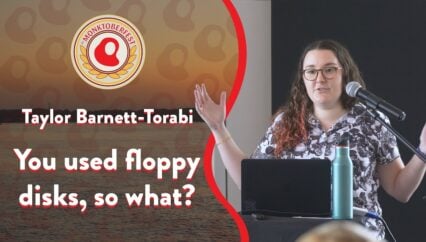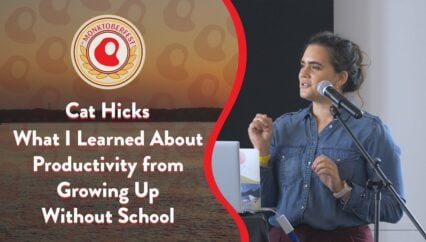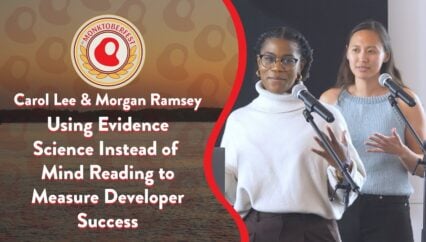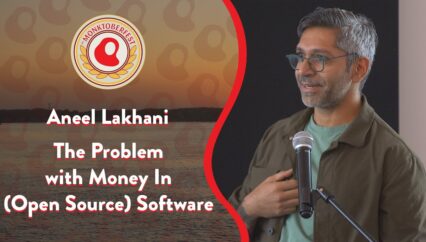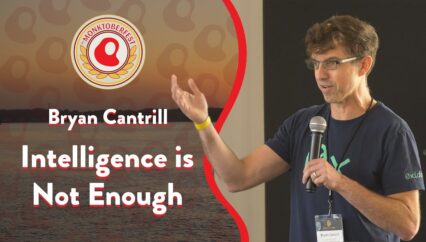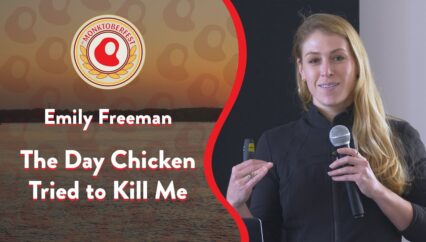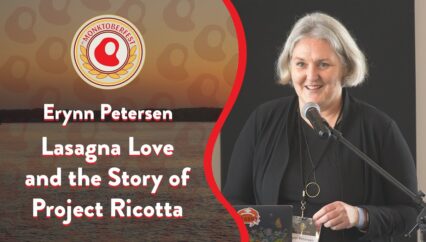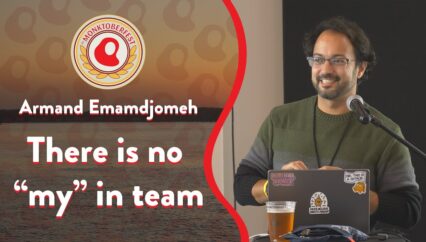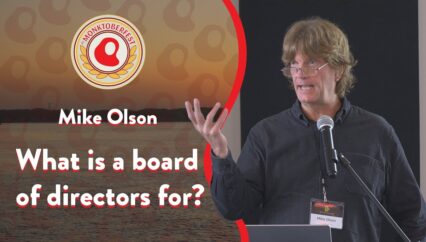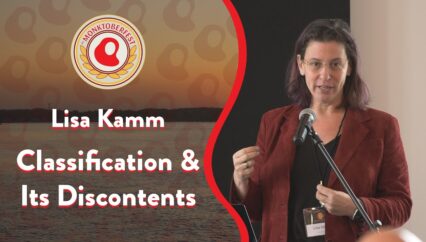Everyone loves the idea of diversity, and many individuals aspire to be supportive allies. Emphasizing diversity in tech events, projects, or workplaces is not only morally right but also brings tangible benefits, such as enhanced innovation, increased employee loyalty, and higher customer satisfaction due to the inclusion of varied perspectives. However, discussions on increasing diversity often overlook the challenges, costs, and potential backlash involved. Addressing these issues is crucial for a comprehensive understanding and effective implementation of diversity initiatives. This talk starts a conversation about these overlooked aspects, offering insights from a passionate advocate of diversity. The goal is to equip others with realistic expectations and practical strategies to navigate and mitigate the stress points associated with fostering diversity.
Transcript
Thank you so much. I’m really excited to be here. This is the first time I’ve been to a Monktoberfest, so you’ll have to keep inviting me back if you want more. So I wanted to talk about like everyone talks about diversity, you know, it’s nice, it’s good, like, there is so much written on it. I could have spent another three hours on just this one slide. It’s important, it’s beneficial, all these good things. But we don’t talk about the rest of that. Diversity, I like, we’ll make good friends, we’ll make the world a better place, everything is awesome, so that’s how it starts. And I was like, yay, welcome to the struggle! And many years later, it’s just like some extra work you do. Or depending on where you work, it might be a lot of extra work you do. And you might also, along the way, find out that not everyone thinks it’s awesome. And it doesn’t cost no money, and it doesn’t take no work, so it might be going more like this.
I read something about this lady is doing fine now. She doesn’t remember even what she was crying about, so in case you’re wondering. I wanted to know.
So as you do this, would, I would urge you to protect your spark. This is something you might find useful is not doing something that doesn’t bring you more joy, not scheduling more hours, not skipping things like eating and going on tours and things like that to do your work, so protect your spark and that means you can’t do it alone.
So that’s the first thing. Like, first of all, just because there are only so many hours in the day, and there’s a lot of work to be done, so if you try to do it all yourself, it’s like boiling the ocean which we’re doing a good job of with climate change, so you don’t have to do that. But I also don’t suggest doing diversity work all by yourself.
Because even as nice as you are, as a single person in your project, like, you can be like, I always say hello to newcomers, I make sure they’re comfortable, tell them where the bathroom is, etc., etc., etc., they will eventually meet the others. And yeah, you can’t keep them from meeting the others.
So you have to bring the others in.
And that’s tricky. I mean, they seem to be having a really good time being jerks here, so you know, it’s going to take some work and you will encounter some resistance. What if you don’t find any allies? No one likes this answer, you have to move on and find another project. When this conference is over, I could make some suggestions if you want. You might have to choose a different tech or a different programming language, somewhere where you will find some allies.
So why is there resistance? I would say first of all people are pretty suspicious of change. So if you have ever tried to keep a toddler from sticking their tongue into an electrical socket, the look they give you, like, “I am not doing it wrong!” like, we learn really early to be like, I was doing just fine. So, like, we keep that with us as adults, I think. Thankfully most of us don’t lick sockets anymore, but we find other ways to manifest that energy to be like, nuh-uh! So I would say tread carefully in your asks, carefully with like with empathy, like listening, making sure you’re hearing things and make sure that you’re not coming across like, you’re doing it wrong when people mean well and they want to help, but they just haven’t been brought up to speed yet. And one of the reasons for that is that best practices continue to change. Like, when I came out in my 20s, like, all diversity about sexuality and gender presentation are all nope, nope, we don’t use any of those words anymore. We use totally different words.
And so that it continues to change. A good example is how we talk about Black people in the US and how people choose to use those words. So if you’re from South Africa, but you’re a white person and you moved to America, are you African American?
That’s like what people were saying in the ’90s, to refer to Black people, like, and it’s confusing, it’s weird, and — I mean it’s probably better than what they were saying before, but … It’s, you know, if someone is Jamaican or Haitian or from Puerto Rico, they might prefer to be called Haitian-American or afro Caribbean and if they’re from Canada, you probably shouldn’t call them American at all. It’s like when people try to be euphemistic, it leads them down some weird paths, someone doing a find and replace and they’re talking about African American patent-leather shoes and it’s like no, no, no, the word you were looking for is black and so this doesn’t work.
Unless you know someone’s background or how they prefer to be called, if you’re talking about skin color, like you’re talking about makeup you’re talking about surveillance cameras or software, the word you’re looking for is black. And you can’t whisper it because it’s not a bad word. So just one example of how just like for I think everyone here is over 12, in our lifetimes, the language on this has changed.
And instead, if you didn’t get caught up on that one, something else will catch you. This almost certainly will happen with you, too. Another thing where best practices or people who mean well kinda get tripped up is they use maybe too broad of a brush and a famous example of this is like, white middle class feminists in the US, being like, oh, women want the same thing, to work outcould side the home. I tell you what, a lot of non-white, non-middle class women, we’re definitely already working outside the home, so they have a lot of trouble bringing their sisters into the movement to be allowed to work outside the home.
When a lot of the folks they were trying this message on, were like, I am definitely allowed to work outside the home and I would like to get off that list if I could.
So that’s one example. Another one that I think people get tripped up on is they learn like one piece of information about an underrepresented or marginalized group and they glom everybody together in the same title.
And one of the places where I see this happen a lot is with Asian-Americans. The experience of an Asian-American person whose parents came out as doctors and were affluent and lived in these communities versus the experience of an Asian-American person who was adopted by white people versus people who came over poor and washed dishes and did janitorial work when they first came over to the US. Extremely different. So you don’t want to be oh, it must have been so terrible for you to grow up poor and it’s like, “my parents are brain surgeons. What are you talking about? I did not grow up poor.” There might be other things that are not so awesome, but making assumptions without information, even if you mean well, can still kind of get you tripped up.
And the bad news is that new stuff you didn’t know is always going to came coming for you you, like Jason Mamoa, I guess depending on your opinion about Jason Mamoa. Anyway, another reason is people feel like they’re giving something up.
And you know, it’s — it’s tricky. Like, you spent a long time preparing something and then you’re like, how about this? And people were like, I mean, we just got the old thing in place and I spent so long on it and we arranged everything around the old thing and uh! And this happens on both a large and small scale. Like every level your operations can be subject to this.
One of the things are seen is people like to work with their friends and that’s really fun, so maybe like you and three of your friends are all in the same D & D group and you work together, there’s a lot of D & D chat, it makes work feel like not work, and then your CTO says something like, we’re doing an external search for that opening and we’re going to try really hard to attract diverse candidates. And like in your mind, you’re like, oh, that was, you know, that was Michael’s spot and it was never Michael’s spot. This is a workplace, you can still have D & D, you don’t have to replace anyone in your D & D game. But then when the person who does get that job comes in, they’re going to be coming in like two steps behind, because they like, took the spot, and it’s tricky, and it’s like, yeah, it is fun to work with your friends. Like, I worked at a bar and they basically hired everyone I knew and it was just like a party all day. You know, but that’s — that’s like we’re trying to get something done, we’re trying to build companies, we’re trying to maybe change the world, make it a better place, and that means like, in addition to diverse hiring, like, also some work-life balance. I’m just gonna, you know, but that’s a whole other talk I could do.
Anyway, the or thing that happens is like money is finite. So one of the things that happens when you decide that you’re going to be doing more diversity is you find out that everything costs money, live captioning costs money. It’s work, people deserve to get paid to do work. Childcare, it costs money. People are doing work. They aren’t your children — it’s not their children. Like, you should get paid to hang out with other people’s children. And so it’s work, and so you know, Covid tests. Does your budget magically grow when you decide to accommodate more people? I assure you it does not.
So you may be thinking, like, oh, I know, we’ll do a diversity sponsorship, we’re actually considering a mask sponsorship for our flagship event next year. Maybe a captioning sponsor or a childcare sponsor, but what if there are no takers?
And that could happen. Then you do the same thing you do for any, like, small, like, nonprofit or underfunded thing, or community-driven event, you fund it out of the same fund for everything else that you want to do and everything else that you already signed a contract for.
So the only thing I would say — and you can tell people like, the more we raise in the general fund, the more accommodating we’re able to be, the more things we’re able to provide.
Do not blow up the diversity work by saying, hey, so we’re going to do childcare this year and take away something really fun that everybody loved. So absolutely don’t do that. If your event has like a chocolate fondue fountain that everyone was — it was all over social media, like people would wear, like, chocolate-covered outfits — don’t do that. Find a chocolate fondue fountain funder and then take diversity out of your other fund.
So don’t pit diversity versus your other budget items.
So you get a little money, you have a fondue sponsor or whatever it is, but there may still be really, really slow. Like, you spent three hours calling venues in Europe to find one that is wheelchair accessible, and then you do, and of course it costs more, because it’s modern and has, you know, up to date bathrooms and things like that.
And then no wheelchair users show up.
That feels like a bummer. And it does. Like, you — I’m seeing that in this room. Don’t say that to like your general community, like I’m bummed that no one came to use the wheelchair-accessible bathrooms, but that might feel like a bummer, you spent a lot of time and spent your money on something and no one used it.
So, first of all, you’re going to need to do a little promo. If you’re going to add accommodations and try to make people be comfortable than previously were comfortable or able to attend your event, you’re going to have to tell them.
So maybe think of it like a restaurant. Maybe you have a lovely successful Creole restaurant. This one is fictional and lots of people come in because you didn’t really provide any vegetarian or vegan options, because it’s not a traditional part of your thing. So you might tempted to do something really half-assed for your vegetarian and vegan options. So you’re like, cool, we have vegan options now, it’s a crust of bread and a little pile of wilted lettuce. Do you think vegans are going to start coming to your restaurant? No, they’re not. You’re going to have to be here’s a beet tartar and
So I would encourage you to do the best of your ability. Like, we went so extra! It is so amazing, the children they have their own slide. If you can get insurance for that, you know, within your means and your understanding, please try to provide your accommodations in this spirit.
Because you absolutely need the positive word of mouth to share it like, hey, you know, like this conference just started adding something and then people come — some people will come and they’ll talk, because people have definitely been disappointed before. These are just a couple of examples. Oh, the venue is wheelchair-accessible, yeah, OK, except for the bathrooms, unless you don’t mind going down like 500 feet from the whole rest of the conference or yeah, it’s wheelchair accessible except the only door you can come in is in the back by the dumpster, you have to call the janitor by their cell and have they come and get you. Also, lunch is on your own, I hope it doesn’t rain. Happens not a wheelchair-accessible conference. Like, the venue when they’re trying to sell you on coming to their venue and giving you money, they’ll say, oh, yeah, absolutely it’s wheelchair accessible, but people have been disappointed before, but if you don’t really provide what you said, it’s going to be really hard for you to come back again. And be really gracious with feedback. Because if you alert someone there and said there was going to be like vegan options and then you give them that crappy Fyrefest lunch, that’s going to be some pretty grumpy feedback, so you’re going to hear that, promise to do better and you are better.
So if you are you gracious in your feedback, people will see that and they’ll share, and they’ll say, well, it wasn’t perfect this year but I talked to the organizer and they said next year they’re going to work to make it better. Because the negative word of mouth is very hard to come back from. So do your best there.
So I saved the spiciest bit for last. Back Lash. So when you’re doing diversity work, some people are like, I don’t know, I don’t have time, do we have? Sometimes you’ll just get full on no, no, no, no no, I if I know, I would spill that tea immediately, but there are some mild intermediary folks and some reactions that I think we can do something about.
Some folks, like complaining is sort of how they see themselves. It’s like their thing, and like, think of the heart of that, is like I don’t real listened to, I don’t feel respected. I care about this a lot, and I see a lot of things, and I feel like it is my duty to share what I see that we’re doing wrong or isn’t going well or isn’t going perfect. So I would say to these folks, like, maybe try and get them off the main channel and complain to you directly if you have the spoons for that. Hear it, hear if there’s anything actual useful in there or if they’re just sort of generally worried, like, I understand or I’ll keep an eye out for that or you know, pick out the one point that were right, yes, you’re right, we should have two caterers, one vegan, one not. So those are just used to everyone kind of being the same. There’s this idea that like you can’t make shitty jokes if everyone is the same. Like, oh, no one will call me out on racist, sexist, homophobic behavior, we’re all a bunch of straight white men. I tell you what, you don’t always know if you’re hanging out with a bunch of straight white men even if you think you are.
So this doesn’t really work. What does work is providing a lot of one-on-one opportunities. So mentorship programs, like, changing your team structure around, these kinds of programs help people like get to feeling like a little less like oh god, I hope I don’t say anything terrible or offensive. And that’s just no, no, that’s just a normal person that I hang out and then you’re like, I have a gay friend now. And that’s awesome, that’s great, so they get a little more chill about it.
Another thing is they feel like prestige is going to people who are not like them and they’re like, wait, wait, I missed my prestige as a straight white male and I’ll never have that again. we’re making up for like five decades of like only straight white men, I don’t know, little rebounds and they just weren’t hearing that.
But be open and transparent about your goals and like your diverse hires, like take on work that showcases their skills and ability and hopefully you get for all your hires to make sure not to skip here. Keynotes, choosing a keynote that’s a little different from your normal or from an underrepresented group and someone is like, I bet they were chosen because of diversity instead of my awesome talk. And so never mind people show up to have the same person give the same talk year after year. Keep it super-positive. Gush about all your speakers, about the expertise, the things they know, the tech that they’re working on, whatever it is, so it’s not — you know, not take the focus, not diversity, this person knows more about Kubernetes than anyone I’ve ever met, that’s why they’re speaking. So yeah, take the diversity piece, or you can talk, you know, also not just about diversity.
Some folks can’t imagine not being centered. And I like capybara sincerely,
So you’ll see push-back on everything.
But the feedback is this year’s restaurant was weird. Can’t we eat somewhere normal next year and you’re like, ugh! Like, you couldn’t have something like in-between. You announce gender-neutral bathrooms that are Bip the elevator on each floor, along request 12 other housekeeping announcements and the feedback you get is I didn’t appreciate having the transgender thing jammed down my throat.
One of your keynotes talk you bees about how hard it was for them as a woman or a person of color to get started in tech and people complain: This is a tech conference, I didn’t want to hear about all the feelings. Some of these are almost direct quotes.
You decide to enforce code safety measures at your conference and you get people should just stay home or stop trying to be people’s mom. So yeah, that one’s real.
So there’s something became slightly inconvenient for me. I had to hear about other people or do things or know things. These feelings can lead to some very angry behavior.
People like the mob is coming to where you are, ability to make decisions about this conference or this event or this project, because like you slept your way there or you bribed somebody or something like that, you’re not that smart, you’re just fooling people. Or you might even see threats of violence or threats that are so confusing that they might be threats of violence? Or I once has to explain to many staff in Europe that one of our speakers who does a lot of diversity work had received a death threat.
So we had to print out a picture of the person who had made that death threat and instruct the venue staff, French-speaking venue staff. My French doesn’t usually extend to this. That if this person enters the building, you must call the police immediately.
And they were like … hm, … OK, yes, merci, and they were like, wait a minute, what kind of conference is this?
I told them it’s about software licensing …:
[laughter]
I don’t think they believed me. So I’m going to talk about the parts we don’t usually talk about. So that’s a bummer to everyone involved, except for the person whose picture we printed out, who didn’t show up, by the way. So I would say keep moving forward and ask for help and support. And continue to kind of ask yourself, who defines normal in your community? Because if it’s not you, it might be somebody else. Like we’re all creating the communities that we are part of all the time. That is like completely us deciding what we want to do. So enforce your Code of Conduct. Like, block people that can’t give feedback without a ton of swears in it. Delete tickets and all those things.
Because that’s the only way we’re going to do it. You have to be welcoming to everyone, except the intolerant, who are going to ruin it.
Give lots of awards and recognition — you won’t even get a chocolate fondue, fountain, sorry. But you will get to be part of an amazing community that is OK with feelings and more vulnerability, a community that wants to help you build an amazing, supportive, welcoming environment, and I hope that will be enough for you. I didn’t know how much I needed that until I came to the Python community full-time, and cut ties with the more toxic parts of the FOS community and I want that for everyone really and I especially want it for the next generation of people that come here to do open source. Thank you.
[cheering and applause]
